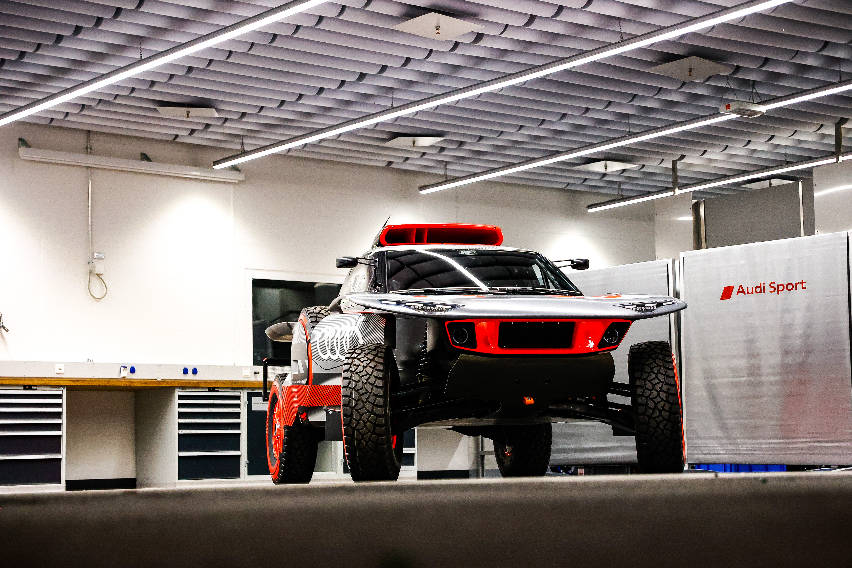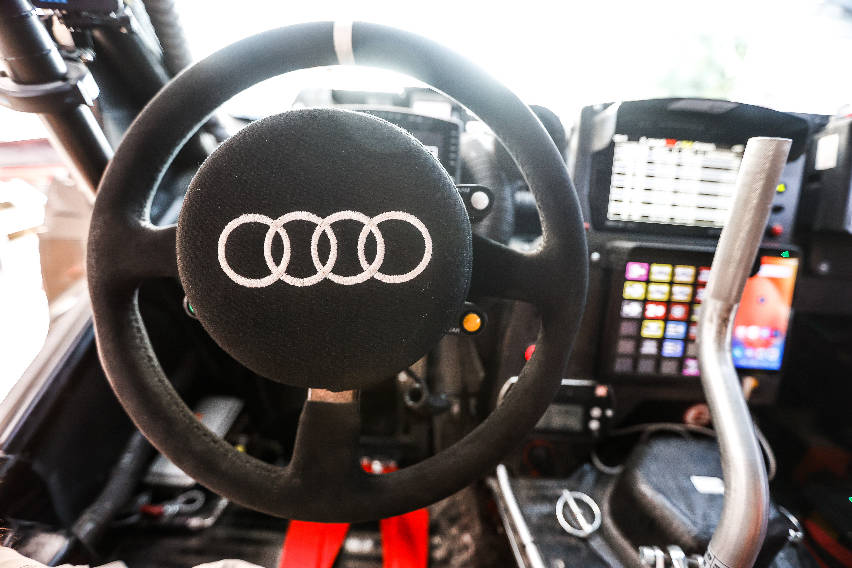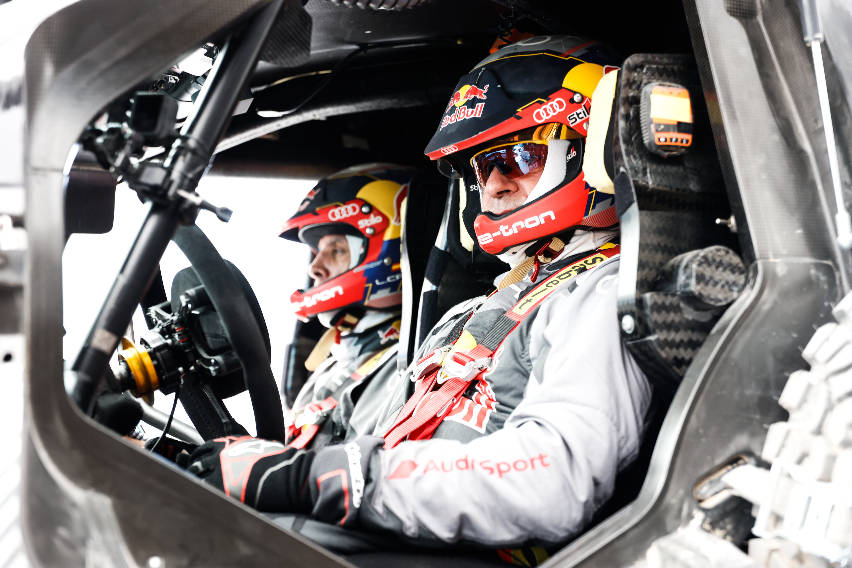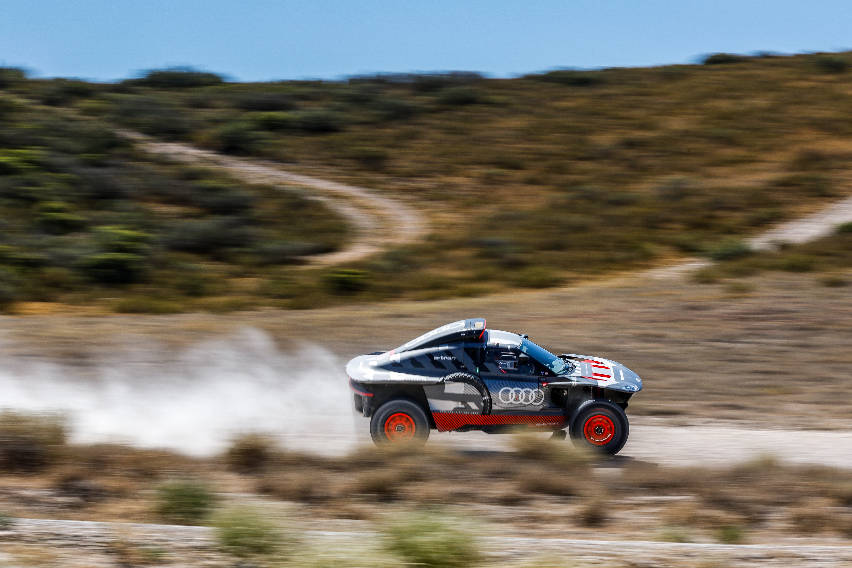Audi unveils ‘evolved’ RS Q e-tron

Audi electrified this year's Dakar Rally when it showcased an impressive performance with the RS Q e-tron. The desert conqueror competed against conventionally-powered entries and achieved numerous feats.
KEY TAKEAWAYS
What are some of the improvements applied to the Audi RS Q e-tron E2?
Per Audi, some of the improvements found in the RS Q e-tron E2 are the new body, redesigned cockpit, and energy-saving measures to help improve its performance.When will the Audi RS Q e-tron E2 prove itself in competition?
The Audi RS Q e-tron E2 will compete in the 2022 Morocco Rally, this October, and in the 2023 Dakar Rally next year.Yesterday, the German automotive brand unveiled the second evolution of the rally-winning dune drifter, the Audi RS Q e-tron E2.
“We’ve managed a good debut at the Dakar with the Audi RS Q e-tron and even our first stage victories in a motorsport discipline that is new to us. The entire team is working excellently together and pulling in the same direction. As is usual at such an early stage, the drivers, co-drivers, and technicians quickly agreed on the next development targets. We have summarized the result in a new evolution package – the RS Q e-tron E2,” said Audi Sport Managing Director Rolf Michl.
The Audi RS Q e-tron E2 is like Daft Punk’s 2001 hit “Harder, Better, Faster, Stronger.” It's all thanks to the improvements applied by the Ingolstadt-based carmaker that makes the second iteration of the RS Q e-tron lighter, more aerodynamic, and even more efficient.
One of the improvements is the use of a new body. Compared to the nameplate’s prototype, the Audi RS Q e-tron E2 has a redesigned front and rear hood. Audi adds that the aerodynamic concept in the area of the body below the hood is completely new. The aforementioned section is almost reminiscent of the shape of a boat’s hull: its widest point is at the height of the cockpit, while the body tapers significantly towards the front and rear. Audi has also removed the rear part of the front wheel fenders.

Its cockpit, which was previously narrowly recessed towards the roof, has been significantly widened.

As a result, the designers saved more weight and optimized the airflow. The improved airflow, explains Axel Löffler, Chief Designer of the RS Q e-tron, “further reduces the energy requirements of the electrically powered car.”
“We implemented the aerodynamic calculations entirely using computational fluid dynamics (CFD),” he added. The computer simulations replaced the time-consuming work in the wind tunnel and still deliver highly precise results.
Overall aerodynamic drag was trimmed down by around 15 percent and top speed remains limited to 170 kilometers per hour (kph) in the regulations.
Energy-saving measures have also been applied. The Audi and Q Motorsport rally team learned during the 2022 Dakar Rally that the air-conditioning system, because it works so aggressively, it could cause the coolant to freeze when constantly running at its maximum output. Audi revealed that in the future, the system will run in an intermittent mode to save energy.
The operating strategy for the fans and the servo pump has also been optimized, allowing the systems to be regulated differently for the lower loads on the liaison stages than on the special stages of the rally races.
The changes applied to the second iteration of the Audi RS Q e-tron also have features that benefit the drivers. While the Audi RS Q e-tron E2 retains the layout of the cockpit displays, its engineers have restructured the displays and controls.

“The totality of all the functions quickly creates confusion. That’s why, for the first time, the driver and co-driver can now select from four system areas using a rotary switch,” said Audi Development Engineer Florian Semlinger.
The four switches — Stage, Road, Error, and Settings — allow the drivers in the Audi RS Q e-tron E2 to easily select the option they need while braving the dangerous desert terrain.

Speaking of which, the Audi RS Q e-tron E2 will have to prove itself in competition for the first time at the Rally du Maroc (2022 Morocco Rally) from October 1 to 6. Audi will once again compete in the Dakar Rally, now with the Audi RS Q e-tron E2, in 2023.
Photos from Audi
Also read:
Audi gears up for future by designing forward-looking production process
Audi unveils Avant e-tron concept EV wagon
1st Audi Sport Drive sees largest collection of Nürburgring-tested cars and SUVs in the country
Featured Articles
- Latest
- Popular
Recommended Articles For You
Featured Audi Cars
- Latest
- Popular
Audi Car Articles From Zigwheels
- News
- Article Feature

